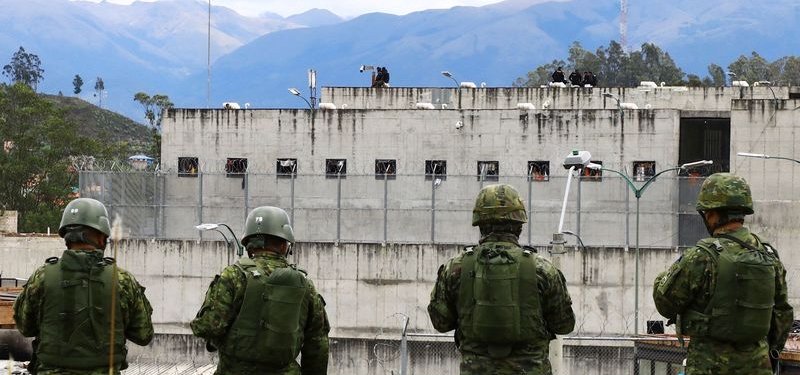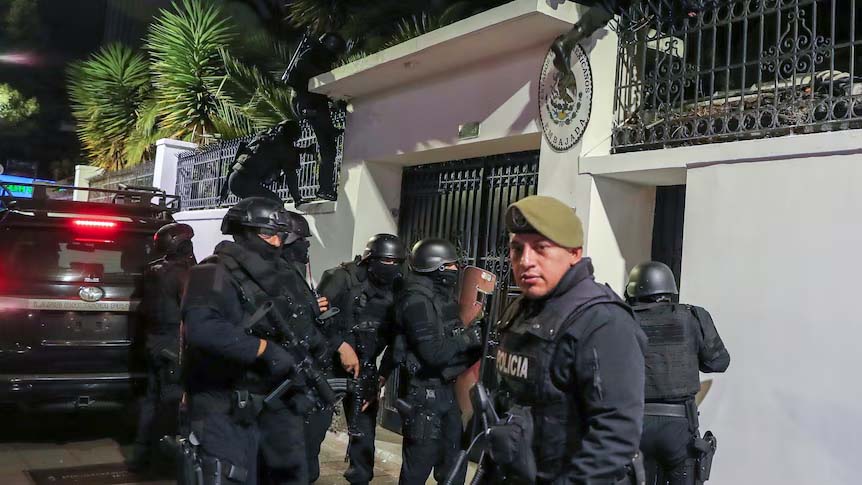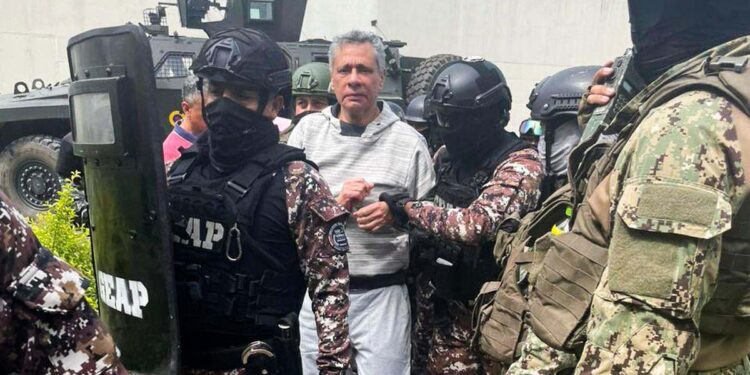by Miceál O’Hurley
QUITO — Further outraged has been expressed in international quarters in the aftermath of Ecuador’s prison authority, known as SNAI, released a Statement claiming detained former Vice President Jorge Glas was discovered Monday in his jail cell in a, “deep self-induced coma”. SNAI claims Glas ingested copious amounts of anti-depressants and sedatives while detained in Guayaquil’s maximum security La Roca Prison.
Just Prior to Publication Glas Was Reportedly Returned to Prison
SNAI announced that following medical treatment at Guayaquil’s Naval Hospital Glas was deemed fit for release. The prison service claims Glas has since been returned to Guayaquil’s maximum-security La Roca Prison. No further information was provided by SNAI concerning any ongoing treatment Glas may be receiving for the alleged self-inflicted “deep” coma or the underlying depression he reportedly suffers.
Prison Services Claims of Self-Induced Coma Contradicted by Medical Personnel
Speaking on background to Diplomacy in Ireland – European Diplomat 3-different law enforcement officials in 3-different countries claimed disbelief that having been detained, transferred and jailed that Glas would still have had access to a supply of anti-depressants and sedatives capable of causing him to slip into the “deep self-induced coma” claimed by SNAI. Speaking on background, one senior South American law enforcement official told Diplomacy in Ireland – European Diplomat, “In every jurisdiction across the globe law enforcement officials not only complete paperwork attesting to the searches they have conducted on prisoners when transferring them to the custody of other policing, jail or court personnel but the receiving officers generally conduct a new search to ensure weapons, drugs or other contraband were not collected by the prisoner along the way. SNAI’s claims make no sense and if it did occur it demonstrates gross incompetence which put police, other inmates and the detainee Glas in danger”.
A professor of pharmacology in Colombia contacted by Diplomacy in Ireland – European Diplomat, who wished to remain anonymous owing to not having specific medical or patient information, also expressed their doubt about the claim as modern pharmaceuticals are specifically engineered to reduce the likelihood of coma or death if ingested in the numbers normally prescribed in each bottle. The pharmacologist noted, “The idea that a prisoner would have in their possession multiple bottles of anti-depressants and sedatives that would pose such a risk is absurd”. She added, “Care would have been given by the prescribing physician and the pharmacist that filled the prescription to ensure any interaction between an anti-depressant and sedative prescribed to a patient did not cause risk from antagonistic interaction”.
Specific information about the specific drugs allegedly ingested by Glas, or the doses in which they were taken, had not been made available at time of publication.
Medical personnel treating Glas have claimed in various interviews that he did not ingest drugs inducing a coma but fainted from dehydration and having refused to eat. SNAI and the Office of the Attorney General of Ecuador have declined to clarify if Glas was treated for ingesting anti-depressants and sedatives, had been in what they described as “deep self-induced coma” or if he merely fainted. No explanation has been offered about how Glas went from a “deep” coma on Monday to being returned to prison within 24-hours on Tuesday.
Questions Abound in Aftermath of Glas’ Alleged Coma
Following his arrest in the Mexican mission last Friday, Glas had been detained overnight in the office of the Attorney General of Ecuador. It is a universally observed and routine police procedure to conduct a full-body and cavity search of prisoners upon detainment. Medical examinations are not uncommon for high-profile detainees.

Within 24-hours of his arrest on Saturday, Glas was observed to be alert and ambulatory upon being transferred from his place of detention in the offices of the Attorney General to an airfield where was transferred to Ecuador’s largest city, the port of Guayaquil. According to SNAI, Glas refused to eat while jailed in Guayaquil and was transferred to the port’s naval hospital for his safety and observation.
Monday evening a small crowd of Glas’ political allies and friends, including family members and lawyers, held vigil outside of the Guyaquil Naval Hospital where Glas was being detained.
Unlawful Lack of Access to Lawyers Alleged
Glas’ legal team expressed “deep worry and alarm” that they have been denied access to their client. Ecuador is accused of holding Glas incommunicado in violation of his civil rights. According to one of his lawyers, Marcel Orellana, “The continuity of persecution is clear, even with his deteriorating state of health. Basic guarantees, such as the right to defense, are being broken and the world and all of Ecuador have to know this.”
Human Rights Watch Detailed Troubling Prison Conditions in Guyaquil
Ecuador is routinely found by legal experts, human rights activists and bodies like the OAS to maintain deeply troubling prison conditions. Overcrowding, dilapidated infrastructure, un-trained guards and poor oversight plague Ecuador’s prisons. Pre-trial detainees are routinely mixed with convicted persons in violation of their rights and unnecessarily elevating the physical danger to which they are subjected.

Children in Ecuador’s prisons are reportedly found to be physically abused, tortured in detainment and sexually abused. Unusually long pretrial detention in these horrific conditions extend not only to detained for serious crimes but for petty crimes and to the general population of children prisoners.
According to a 2023 Human Rights Watch report, Ecuador has failed to take sufficient steps to remedy poor prison conditions. Between February 2021-October 2022, 9-massacres took place in Ecuadorian prisons resulting in approximately 400 detainees killed and dozens injured. Human Rights Watch maintains that as of August 2023, none of the participants in the riots that led to the killing of the approximately 400 detainees have been convicted for their participation in those crimes.
Glas’ Detention Caused International Outrage
Glas had been arrested by Policía Nacional del Ecuador forces late last Friday evening despite being within the confines of the Mexican diplomatic mission to Ecuador in Quito’s financial district. Glas had been granted asylum status by the Mexican government who has previously denied Ecuador access to their Embassy to effectuate an Ecuadorian arrest warrant. The Vienna Convention on Diplomatic Relations 1961 requires that host nations regard diplomatic missions as “inviolable”. Formal complaints concerning Ecuador’s violation of the sovereignty and violability of Mexico’s mission in Quito are being prepared for presentation to the United Nations.

The raid on Mexico’s mission followed a week of escalating tensions between the two American States which saw Ecuador declare the Mexican Ambassador to Ecuador, Her Excellency Ms. Raquel Serur Smeke, persona non grata. Ecuador’s Foreign Ministry had ordered Ambassador Serur Smeke to depart the country “soon” prior to conducting the raid which saw Glas captured within the Mexican mission’s compound. Several Central and South American States have cut diplomatic ties with Ecuador in a show of solidarity with Mexico. The Organization of American States (OAS) is considering action on the matter this week.
Ecuador’s President Defends Raid on Mexican Embassy and Arrest of Glas
Daniel Noboa, Ecuador’s new President, ran on a platform of being tough on crime and restoring domestic tranquility. Security conditions in Ecuador have become challenging with routine crime and gang violence impacting 1-in-3 Ecuadorians. As of October 2023, homicide rates in Ecuador increased to almost 16-per-100,000 residents – one of the highest in South America. Indigenous poverty rates, lack of general access to health care, fuel and food insecurity and rising unemployment and poverty gaps have led to public demonstrations amid the ongoing societal tumult.
Defending his decision to raid the Mexican mission in violation of international law, Noboa has since asserted he had an “obligation” to arrest Glas and other criminal fugitives otherwise law enforcement would have faced, “the imminent risk of their escape.” Noboa continued, “Ecuador is a country of peace and justice, which respects all nations and international law.”
Critics claim Noboa’s assertions are irreconcilable with Ecuador’s decision to violate their obligation to maintain the Mexican mission as “inviolable”.
















































